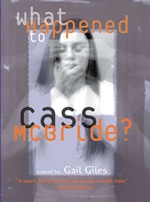TEACHING GUIDE
What Happened to Cass McBride?
By Gail Giles
Thematic Connections:
Revenge
Fears and Phobias
The Power of Words
Relationships
Power and Control
Before Reading
Write about one or more of the following questions in your journal:
Under what circumstances is revenge justified? How does revenge get out of hand?
What are some commons fears, or phobias? What is the best response to fear? Why?
Describe a time when you said something you later regretted. What did you do about it?
Children are sometimes taught this rhyme: “Sticks and stone may break my bones, but names (or words) can never hurt me.” Do you agree or disagree with this message? Why?
How do parents show love for their children? What happens when a parent fails to love a child?
What are some ways that people manipulate one another to get what they want? When is manipulation okay? When does it go too far?
Discussion Guide
Knowledge:
How does Kyle kidnap Cass?
Cass uses “Ted’s rules” to help her decide what to do. List at least five of Ted’s rules.
Whose name does Kyle want Cass to say? Whose name does he forbid her to say?
What does Ben observe about Cass’s house?
What does Cass think of Kyle the first time she sees him? What does she do when he ignores her?
How does Cass respond when David asks her out?
What does David say in his suicide note? What does he do with the note?
Who is Leatha, and where does she live?
What do kids at school say about Cass? What do they say about Kyle?
According to Cass, whom does Kyle really want to punish?
How do the officers figure out who kidnapped Cass?
What makes Kyle leave Cass and go home?
What does Kyle threaten to do to his mother?
Why didn’t Kyle’s father become a doctor? What does he do for a living? In what way is his job relevant to the story?
Where is Kyle at the end of the book? Where is Cass?
At the end of the book, Cass is confused about how much time has passed. What clues indicate that several months have gone by since she was rescued?
Understanding:
How might the story have been different if Cass had not taken her dad’s Xanax?
Kyle says he wants the camera to tell his story, but then he wants it turned off. Why?
How does Cass figure out what happened to her?
When he meets Ted, Ben says he feels “spider feet” on his neck. What does he mean? What about Ted makes him feel that way?
Of the big cop, Kyle says, “This guy must be sick” (page 22). What makes Kyle say this? What is ironic about his statement?
When her mother left, why did Cass stay with her father?
Ted tells the officers that he could “talk my way past your electrodes” if he had to (page 40). What does he mean? What does this statement indicate about him?
When David tells Kyle to look around the park for the reason for flying dreams, Kyle sees a child flying. Who is that child? How do you know?
According to Leatha, why is Cass so important to Ted?
Kyle admits that he came to resent David. Why?
Why doesn’t Cass believe the officer who says Kyle is in prison? Do you agree with her logic? Explain.
Application:
Kyle accuses Cass of being self-centered. She readily admits to it. She manipulates people to get what she wants. Her dad says he has taught her to take care of herself. At what point do looking out for yourself and getting what you want become something bad? Give examples from the story and from life.
Hearing David’s name sends a jolt of fear through Cass (page 33), a fear that seems as terrible as being in the box. What makes fear connected with guilt so powerful?
According to Leatha, the relationship between Cass and Ted is not one of real love. What constitutes real love between a parent and a child?
What does Ted mean when he talks about selling someone their self-doubts? How does Cass use this idea with Kyle? How does Ted use this idea with Cass?
Analysis:
When readers first meet Kyle, he says that Cass got what she deserved. He also says he doesn’t like for people to see him bleed. What paradox does he reveal about himself in these two statements?
Cass seems to know herself well. How well does Kyle know himself? Give examples to support your answer.
Cass says that her enemy’s weakness is her advantage (page 101). What are Kyle’s points of weakness?
Do you agree with Leatha when she says that Cass hasn’t heard her heart, that she lives in her head? Why or why not? Has this situation changed by the end of the book? Give evidence to support your position.
Synthesis:
Early in the book (page 10), Kyle says Cass is evil. Do you agree with his assessment? Why or why not?
We’re told that Cass is a good student, but what evidence do we have that she is smart in dealing with people? Give examples involving both Kyle and others.
The same qualities that brought Cass down are the qualities that saved her. How true is this statement? Support your answer with examples. from the book.
Discuss the relationship between Cass and her father. In what ways is it healthy? In what ways is it not? Cite examples from the text to support your position.
Discuss at least three psychological principles that Cass uses to get herself out of her predicament.
Evaluation:
How do the short chapters and alternating points of view contribute to the power of this book?
Kyle tells David to set his sights high, first in climbing a tree and later in asking a popular girl for a date. What do you think of his advice and his motives for giving it?
Kyle and David’s mother defends herself by saying, “Everyone thinks I’m heartless. But I’m simply honest.” Do you agree with her assessment? Why or why not? What is the difference between honesty and heartlessness? Give examples.
Kyle spends his time in jail with law books, trying to figure out how to put his mother in jail for David’s murder (page 211). Who was responsible for David’s death? Why?
Cass says that someone who buries a person alive should be locked up forever (page 212). Do you agree that this is what should happen to Kyle? Why or why not?
At the end of the book, Cass is choosing not to talk. Is this realistic under the circumstances? In what ways is this an appropriate ending?
Consider the book’s title, Whatever Happened to Cass McBride? In what ways is this a good title? Aside from being buried alive, what happened to Cass?
Projects
Empathy Meter: Look up the term “empathy.” What does it mean? Draw an “empathy meter” that measures empathy on a scale of one to ten. Pick five of the characters from the story and place them on the meter. Beside each character’s name, note two reasons for your character’s empathy rating.
Media Literacy: Working alone or in a group, list all the tools of salesmanship that Cass learns from Ted. Make a collage of magazine ads that use these tools to sell products. When you present your collage to the class, discuss how Cass uses each tool to her advantage.
T-Chart: The words Cass wrote hurt David deeply. But Cass also wonders about the hurt of an unsaid word (page 165). Later she wonders if unspoken words speak the loudest (page 209). Working alone or in a group, make a T-Chart. At the top of the chart, write “Words Hurt.” At the top of the left-hand column, write “unsaid words.” At the top of the left-hand column, write “spoken words.” Fill in each column with five examples from the book.
Venn Diagram: Kyle says that his mom and Ted are a lot alike (page 185). In what ways are they alike? In what ways are they different? Make a Venn Diagram in which one circle represents Kyle’s mother and the other represents Ted. Note their similarities in the overlapping part
Word Map: Cass says that when the words make sense and all the blame is where it belongs, she’ll be ready to talk again (page 212). Make a word map with the word “blame” in the middle. Branching out from the word, write the names of at least five of the characters from the book. Branching out from each character, note the ways each is to blame and the ways each is not to blame for what happens.
Author Connections: Choose one of the following characters from another Gail Giles book.
Young/Shattering Glass
Sunny/Dead Girls Don’t Write Letters
Skye/Playing in Traffic
Make a chart showing how the character compares and contrasts with Kyle. Include the following on your chart: appearance; positive actions; negative actions; significant statements by the character; what others say about the character; adjectives to describe the character; reasons for the character’s actions; what happens to the character in the end.
Beyond the Book: Read The Prince, by Niccolo Machiavelli, a medieval book of advice on how to get and keep power. On what points would Ted agree with Machiavelli? On what points would Kyle agree?
Author Interview
What inspired you to write this book?
There had been a record snowfall in Anchorage that year and I couldn’t see out my windows for most of the winter. I felt rather entombed. Coupled with a writer’s block that had been partially caused by a few things said to be that rattled my confidence and made me reflect on the impact of a lifetime of emotional abuse--I started combining the two things. The idea of really seeing clearly when you are alone in dark struck me then.
From your descriptions of what it’s like for Cass in that box, it almost seems as if you’ve been buried alive yourself. How were you able to describe her situation in such excruciating detail?
I did some research on dehydration, but most of it was imagination. I am claustrophobic, mild to moderate.
Cass is a fascinating character. How well did you like her at the beginning of the book, and how did you feel about her by the time the book ended?
I understood Cass and felt some sympathy, but I can’t say she was likable. I didn’t really want her to be. It’s part of my self challenge to get people interested in my books even when the character isn’t all that sympathetic. But I want the reader to see that person and understand what made them that way.
How important are parents in determining what kind of people their children become? Given his difficult home life, what might Kyle have done differently?
Yes, home life is important. There’s no doubt. It makes everything easier or harder as the individual case may be. But Kyle knew right from wrong and he had choices. I wanted that to be clear. While he has been victimized by his mother, he certainly is not a victim in the kidnapping.
Your books might be described as having “shock value”? What do you think that means, and why is it important?
While what I write is shocking, I don’t consider that the point. The point is how did these people get here? Why did they make such bad decisions?
Every writer has a style. How would you describe yours?
People say my books leave you hanging. I say that is because the journey isn’t complete. And the story is about the journey not the arrival. But I would guess my style is fast, intense and dark, leaving the reader with a lot of questions to mull over about life and how we live it.









